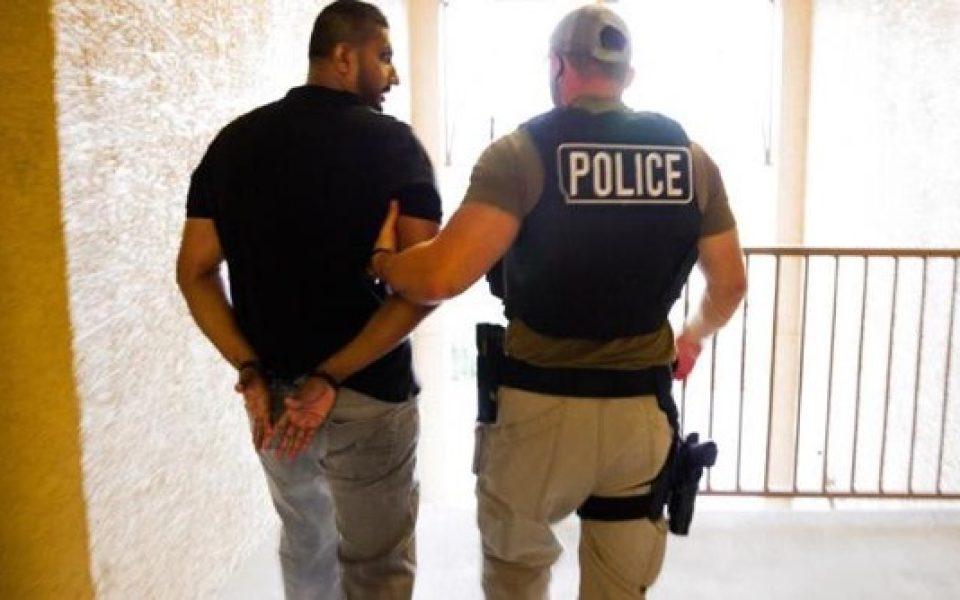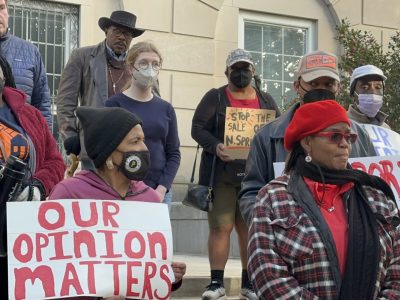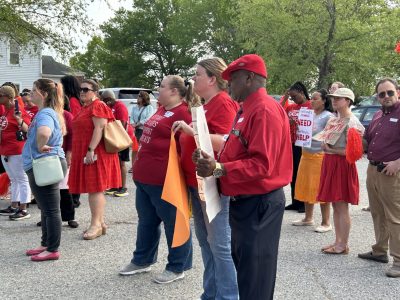Despite promising to not target immigrants, Winston-Salem police officers made a handful of discretionary arrests in the first five months of 2017 involving traffic violations committed by undocumented people who are prohibited by state law from obtaining driver’s licenses.
Dulce Karina Peralta, a 22-year-old Winston-Salem resident, was driving a 2004 Hyundai station wagon on Reynolds Park Road not long before midnight on Jan. 29 when a Winston-Salem police officer pulled her over for a broken taillight.
The infraction would typically result in a verbal warning or a written citation, but, likely due to the fact that Peralta was not carrying a driver’s license, Officer ST Johnson exercised the discretion to arrest her and book her in the Forsyth County jail. As a penalty for driving a car with a broken taillight and not having a driver’s license, Peralta was one of 53 people who landed there in the first five months of 2017 and wound up being deported after US Immigration and Customs Enforcement flagged them for removal.
A Triad City Beat analysis of court records for 35 undocumented inmates at the jail who were claimed by ICE for deportation revealed five cases like Peralta’s, where defendants wound up in jail for traffic violations or minor infractions. The remainder of the charges were evenly divided between felonies ranging from human trafficking and cocaine possession to indecent liberties with a child; driving while intoxicated; and other misdemeanors, ranging from domestic violence charges to drug paraphernalia.
The Winston-Salem Police Department accounted for 71.4 percent of these arrests of undocumented persons handed over to ICE, with the Kernersville Police Department, Forsyth County Sheriff’s Office, State Highway Patrol and state Division of Motor Vehicles filling out the remainder. One of the felonies — brought by the DMV — involved a 21-year-old Senegalese man and Winston-Salem resident of four years, Papa Alioune Diagne, who was charged with identity theft for possessing a fake Social Security card. (TCB was unable to locate information about local charges for the remaining 13 individuals identified by the Forsyth County Sheriff’s Office as being held on pending criminal charges and subsequently turned over to ICE.)
Neither the number of people funneled through the jail to ICE nor the breakdown of offenses is especially surprising, but arrests for traffic offenses have prompted acute anxiety within the immigrant community and drawn particular scrutiny among advocates.
FaithAction International House has been working with several law enforcement agencies across the state, including the Winston-Salem police, for four years on an ID program to provide undocumented people and others with identification in an attempt to build trust between immigrants and the police. One purpose of the program is to provide undocumented people with ID so that police don’t have to take them into custody for minor traffic offenses like driving with expired tags or speeding, which would ordinarily be handled through a written citation or verbal warning.
“Part of what we’re attempting to do is have law enforcement understand there are many people who are hard-working and contribute to our community and simply cannot under state law obtain a driver’s license,” said David Fraccaro, FaithAction’s executive director. “What are they supposed to do? Otherwise, it’s not going to work or going to school. A lot of people have to take that risk every day. This wouldn’t be happening if we had a more empathetic state law and federal immigration reform. That would make our roads safer. I hate that anyone is a victim of the inaction that’s happening at the state and federal level.”
Soon after the election of Donald Trump, a coalition of activists began lobbying Winston-Salem City Council to declare itself a sanctuary city — a status that would have directly violated state law and fly in the face of a Trump executive order. As a compromise, Councilman Dan Besse proposed a “Welcoming City” resolution, which declared in a proposed draft: “The city of Winston-Salem recognizes that our whole community is safer when victims and witnesses of domestic violence or criminal activity feel safe in contacting our police for assistance without fear, regardless of their immigration status.”
Besse wound up pulling the resolution from consideration when his colleagues balked at supporting it under the threat of punitive legislation from state lawmakers. In response to council members anxious to reassure their constituents about the city’s role in immigration enforcement, police Chief Barry Rountree drafted a memo dated Jan. 30 declaring: “Members of the WSPD do not ask immigration status, initiate immigration roundups or gather immigration status information during the course of providing law enforcement services.”
Fraccaro characterized the Winston-Salem police as “one of the more hesitant departments in how they talk about their relationship to the ID card.”
Lt. DL Anthony, a field commander with responsibility for patrol on the east side and part of the west side of the city, confirmed that officers have the discretion to take traffic offenders into custody if they aren’t carrying identification. He said the FaithAction ID is one form of identification officers look at, but they typically want to see additional documentation.
“It’s something we look at, but without something to support that document it raises suspicion,” Anthony said. “Some further identification like a bill with their name and address on it may give credence to that card. But with just the card itself the officer may need to do a little more digging.
“If that person can’t prove to the officer that makes the stop who they are, then I would encourage the officer to make the arrest because if they produce a name and we can’t link it to that person, it might be the name of some other person,” Anthony added. “That other person’s license gets suspended because they don’t know they’ve been issued a citation.”
Will Cox, an activist with the Sanctuary City Coalition of Winston-Salem, said that because of ongoing dialogue between clergy members and the police about immigration, he would expect officers to understand the consequences of taking an undocumented person into custody.
“It’s really an outrage to have local law enforcement saying, ‘We’re not targeting folks’ — they’re saying, ‘We’re only going after bad actors,’” Cox said. “If you look at this, the bad actor is anyone who’s complicit with any type of targeting of the immigrant community. Law enforcement is the spear tip. That’s where the choice has to be made.
READ MORE BY CLICKING THE TAB BELOW >>>
Although felony and misdemeanor cases make up the bulk of local charges that put undocumented people in the pipeline for deportation, observers say they have seen ICE move more aggressively to claim custody of immigrant detainees since Trump’s inauguration.
“Since early this year, things have ramped up,” said Alan Doorasami Sr., an attorney who practices both immigration and criminal law with the Law Office of Alan Doorasami Sr. in Winston-Salem.
One of Doorasami’s clients, a young woman who came to the United States at the age of 2 and holds Deferred Action for Childhood Arrivals status, was arrested shortly after her 18th birthday in June and charged with stealing a stick of lipstick from Walmart. Doorasami said the young woman’s friend, a US citizen, pleaded guilty to stealing cosmetics, but his client denies taking part in the theft. In June, before she had a chance to appear in court, Doorasami said, she was taken into custody by ICE and transferred to the Stewart Detention Center in south Georgia.
“This is an extremely serious issue,” Doorasami said. “One, she denies it. Two, she wasn’t even given a chance to go to court and tell her story. Plus, she’s a DACA recipient; she has a right to live here. That particular case is a deep concern. That’s what the public needs to know about.”
Many of the people in the undocumented community facing local charges in Forsyth County would have been in jeopardy of deportation even before Trump was elected.
“ICE is picking up people for very simple offenses,” Doorasami said. “DUI and domestic violence — they are way up on the ladder.” He added that people charged with those offenses were considered priorities for removal by ICE “long before Trump was elected.”
Antonio Mejia Zarate, 32, was arrested for DWI by a Winston-Salem police officer after his 2006 Dodge pickup was involved in an accident near Jonestown Road and Still Point Drive at 9:15 a.m. on June 21, 2016, according to court records. The arresting officer noted there was a child in the vehicle, and charged with Zarate with the most serious level DWI.
Zarate completed a 40-hour class and earned a certificate of completion from Life Changes Counseling Short-Term DWI Alcohol & Drug Treatment on Feb. 17.
Cris Liendo, a counselor with Life Changes, gave Zarate a glowing review in a letter to the court.
“While attending treatment, Mr. Zarate actively participated and applied the information discussed during our sessions,” Liendo wrote. “This client was very punctual, responsible and honest about his situation. He did excellent the entire time he was attending our program.”
Zarate pleaded guilty on Feb. 22, and Judge Lawrence Fine sentenced him to 30 days in jail with supervised probation of 18 months. Five weeks later, Judge Fine signed a modification of probation, noting, “Defendant has been picked up by ICE on 3-24-17. Verified by letter from ICE agent. Defendant has been moved to South Carolina.”
Once undocumented immigrants booked into the jail are flagged by a national database, ICE has the opportunity to take custody of them and file a detainer — a voluntary request for the jail to hold them.
“I hate those ICE detainers,” said Lonnie Albright, the assistant county attorney assigned to the sheriff’s office, led by Sheriff Bill Schatzman.
“Agencies are getting sued all the time,” Albright added. “If that person is here a couple hours and bonds out, we have no legal basis to hold them.”
Albright said he recalled at least one undocumented inmate in the past six months who bonded out of jail, only to encounter ICE agents waiting in court when he made his first appearance.
“Being here undocumented — that is not in and of itself a crime,” Albright said. “Those who were deported and come back — that is a federal crime and the sheriff will enforce the law. The sheriff is not out to do a roundup, no sir.”
Arrests by Forsyth County sheriff’s deputies — including two DWIs and one misdemeanor involving a man who allegedly pointed a gun at a woman — accounted for only three of the 53 local charges that landed undocumented people in jail in the first five months of 2017.
***
While the Forsyth County jail marks the beginning the journey for some undocumented residents of Winston-Salem and the surrounding area, for others the jail is a transit point. The sheriff’s office contracts with the US Marshals Service to house up to 50 male and five female inmates in the jail, to be reimbursed $70 per day. The contract also allows ICE and the US Bureau of Prisons to lease the beds. From January through May, 104 undocumented people in federal custody passed through the jail — almost twice the number of undocumented people held on local charges.
Albright said he knows little about the federal inmates at the jail, including where they come from and where they go, but local advocates have said many undocumented people housed at the jail are ultimately transferred to Stewart Detention Center, a for-profit facility operated for ICE by CoreCivic, formerly Corrections Corporation of America, in Stewart, Ga.

©
The current population of detainees in federal custody held in Forsyth County includes three men who were arrested by ICE agents outside San Miguel Market on Yanceyville Street in Greensboro at 6 a.m. on July 25 while they were on their way to jobs with a local construction contractor. They are Adrian Balderas Plata, 40; Raul Ortiz Garnica, 21; and Jeovany Argueta-Garcia, 39.
One of the men leaves behind a wife who is 9 months pregnant. “I don’t know what we’ll do if my husband can’t be here for our child’s birth,” said Guadalupe Jocelin Cruz Lopez, a former Southern Guilford High School student and the wife of Garnica. “But everyone needs to know this is happening. ICE is coming for our families.”
The American Friends Service Committee is raising money to cover the families’ expenses, estimated to be more than $1,500 per month for rent, utilities and food. The Rev. Julie Peeples said in a statement distributed by the committee: “As people of faith, we hope community members will support these families, and will give generously so that they can get through this difficult time.”
Peeples’ church, Congregational UCC in Greensboro, is providing sanctuary for Minerva Garcia, an undocumented woman from Winston-Salem who is defying a deportation order from ICE.
Advocates have come to recognize a desperate reality for undocumented families attempting to support themselves while minimizing exposure to ICE and local law enforcement. David Fraccaro, the executive director of FaithAction, said his organization counsels clients to fix any broken taillights, refrain from speeding and carpool, if possible.
“We’re working on three fronts,” he said. “We’re working to support families who come to us because a family member is charged with a DWI or domestic violence. But we also try to counsel them to avoid at all costs breaking the law in the first place because the consequences can be catastrophic. If you have a broken taillight, you’ll want to get that fixed immediately. At the same time, as much as possible, we want people to be able to live lives of dignity and joy. It’s a really tough balance to strike.”
Joel Sronce assisted with research for this story.
Join the First Amendment Society, a membership that goes directly to funding TCB‘s newsroom.
We believe that reporting can save the world.
The TCB First Amendment Society recognizes the vital role of a free, unfettered press with a bundling of local experiences designed to build community, and unique engagements with our newsroom that will help you understand, and shape, local journalism’s critical role in uplifting the people in our cities.
All revenue goes directly into the newsroom as reporters’ salaries and freelance commissions.





Leave a Reply